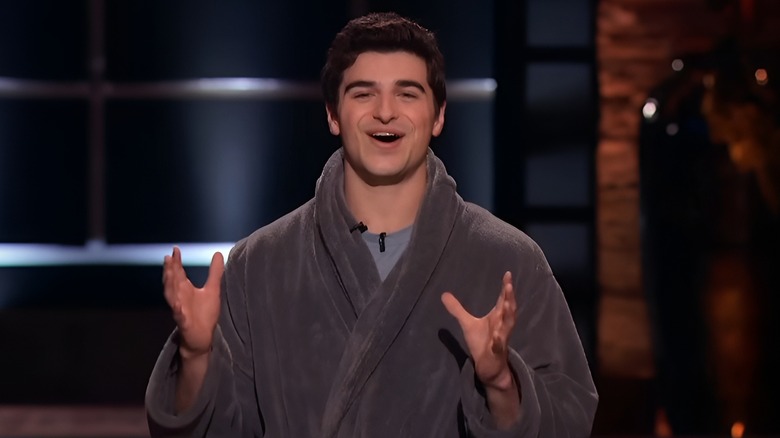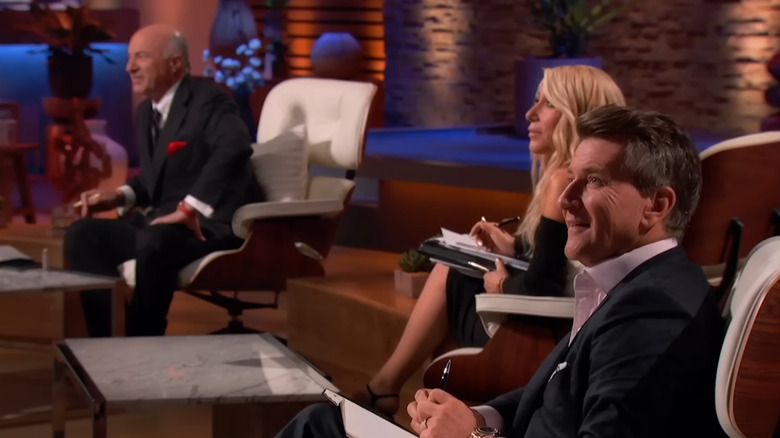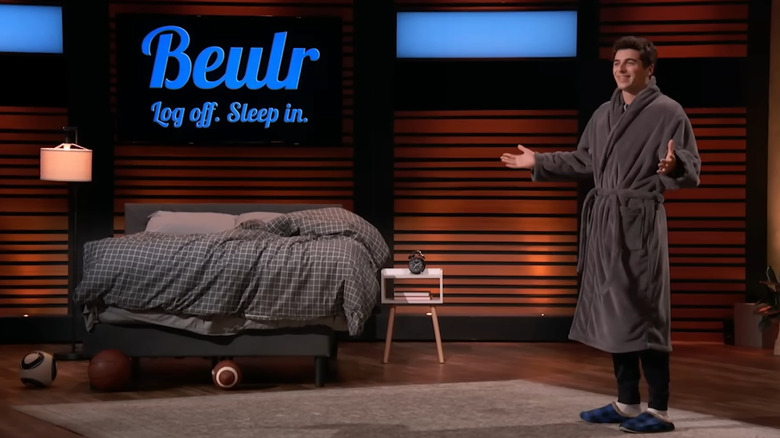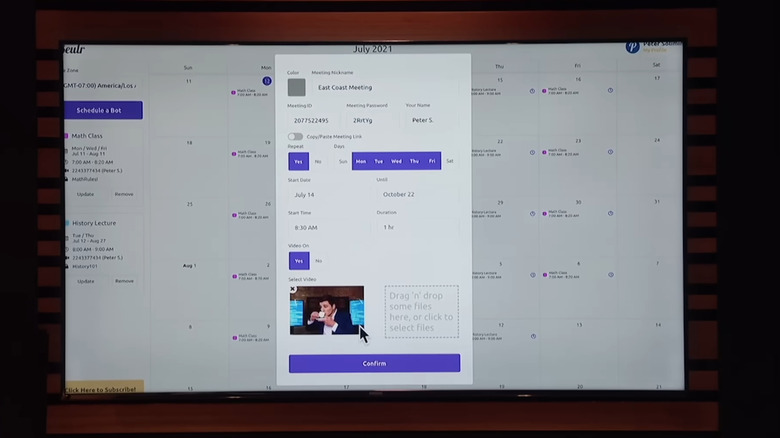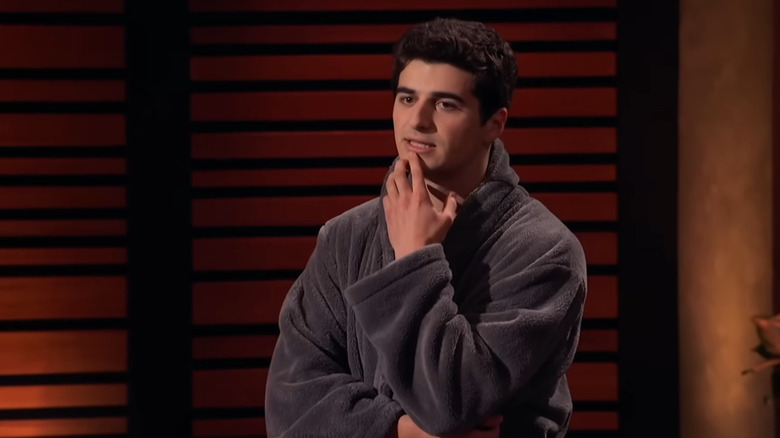What Happened To The Beulr App From Shark Tank Season 13?
How we attend meetings and classes has changed drastically in recent years with the use of platforms such as Zoom, which has a wide array of powerful features. But what hasn't changed is the meaninglessness of some of the meetings, with it feeling like our time could be better spent doing anything other than staring at a screen for an hour without uttering a word. One "Shark Tank" entrepreneur aimed to alleviate this problem with Beulr, a program that utilizes looped recordings of yourself to stand in during video meetings.
Appearing on the fifth episode of "Shark Tank" Season 13, Beulr founder Peter Solimine entered the tank seeking a $150,000 investment for 20% of the business. He made a memorable entrance, coming out of a bed on the set to present how Beulr allows him to sleep in. Solimine charmed the sharks with his laid-back and fun-loving personality while also demonstrating some solid knowledge, but he left without a deal due to ethical concerns with the concept and issues regarding the business model.
Beulr came to be while Solimine was a student at Tulane University. Like countless colleges across the world, Solimine's school was forced to convert its classes to online learning in March 2020. With Solimine's first class being a lecture-heavy 7 AM course, he developed a program that would open Zoom and have a bot attend for him. The program, which was named after the titular teenage slacker from 1986's "Ferris Bueller's Day Off," gained traction as Solimine dropped out of college soon after and accumulated a rapidly growing number of users despite little marketing.
What happened to Beulr on Shark Tank?
Rather than walking through the big doors that most "Shark Tank" contestants enter through, Beulr's pitch began with a video of founder Peter Solimine playing before the confused sharks. Soon after, Solimine came out of a bed on the set in a robe and slippers. He explained he was able to sleep in thanks to his pre-recorded video being set up. From there, he pitched how Beulr worked and got a good number of chuckles from the investors.
Robert Herjavec asked the obvious question: what happens when you're in a meeting and someone asks your bot a question? Solimine responded that all the company provided was a static looped video with no interactive element, which caused some unease. Nevertheless, Beulr had been showing growth with 92,000 users, who had primarily heard of the service through word of mouth, as Solimine had only spent $300 on marketing. At first, the team did not charge anything for the service, as growth was their primary concern. However, after dropping out of school, he implemented a $6.99 monthly subscription cost and was then making $1,000 every month since adopting the model.
Ultimately, none of the Sharks took the bait. Some, such as Lori Greiner, Kevin O'Leary, and Daymond John, were not fans of the ethical appearance of the company, given it encourages people to skip mandatory meetings or classes where attendance is legally required in some areas. Mark Cuban and Robert Herjavec failed to see the business model working out in the long run due to the costs it would take to scale it effectively.
Beulr after Shark Tank
The main purpose of "Shark Tank" is to tell a story and entertain. This, combined with segments being edited down from recordings that can last upwards of an hour, means that what viewers see on TV may have a drastically different tone than what took place during filming. This seemed to be the case for Beulr, as founder Peter Solimine's accounts of how his pitch went down greatly differ from how the show portrayed him.
The segment received mixed reactions following its broadcast on November 5, 2021. While many found Solimine himself charming, others heavily criticized Beulr itself for being ill-fit for a professional environment. In an interview with Joe Pardo, Solimine explained that the show's choice to place emphasis on the sharks' critiques of his business was incorrect, stating, "When I walked out of the tank ... I thought I killed it ... and then when I watched it air, I was like, 'I do not remember this happening.'" Even though Solimine shared that he initially came seeking publicity above all else, the pitch went well enough that he came close to making a deal with Mark Cuban.
Regardless of the show's depiction of Solimine or any follow-up criticism, the segment nevertheless had the desired effect of getting Beulr an influx of new business. By the Monday following the episode's airing, Beulr's user base skyrocketed to 126,000 users. Things also turned around financially for the company, as new investors came on board with $675,000 worth of funding in the episode's aftermath, going far beyond the $150,000 ask the entrepreneur sought on "Shark Tank."
Why did Beulr go out of business?
While Beulr showed plenty of promise despite not receiving a deal on "Shark Tank," it wasn't to last. According to founder Peter Solimine's LinkedIn, the company closed its doors in November 2023. As of this writing, there's no official word as to why Beulr came to an end. Its Facebook and X accounts no longer exist, with the most substantial points of reference to its existence outside of its "Shark Tank" segment being the business' inactive LinkedIn page and Solimine's personal website on the My Projects page, where it only states, "Probably why you're here, RIP."
It appears that the team made an attempt to appease critics of the service towards the end of its life. Rather than advertising Belur as a product intended to help students skip school and employees sleep in on important business meetings, the company's LinkedIn page describes it as "an AI productivity platform that records and transcribes online meetings." The refreshed branding was meant to place more emphasis on the positive habits that could come from using the app, similar to that of GoalSetter from three seasons prior. Whatever the reason may be, it seems that even Beulr's best efforts did little to save it in the end.
What's next for Beulr's founder?
It's likely that a business named after a fictional character best known for cutting class would drum up some level of controversy. But in the case of Beulr, it's fair to say that judging the company and its founder squarely from its "Shark Tank" segment alone would not be a fair assessment. It's clear that Peter Solimine is a smart and capable individual who, while certainly more laid-back than your typical entrepreneur, knows his way around his space and could have found ways to advertise the service to those with video call stress or who are too busy to attend more than one video call at the same time. But whether from the lackadaisical manner his "Shark Tank" segment was presented, the viability of Beulr's business model, or Solimine's own decisions as a businessperson, Beulr struggled to maintain relevance long after its time in the spotlight.
As of this writing, Solimine remains active in the software development space. In November 2023, the same month when Beulr closed its doors, Solimine founded a new startup with an AI-powered language learning app known as SayBloom. While this venture only lasted three months, the service itself still exists with a free and paid version to choose from. Since February 2023, Solimine has worked as the co-founder and CEO of Parallel Distribution, which specializes in helping brands grow through short-form content on platforms such as TikTok.
